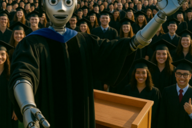You have /5 articles left.
Sign up for a free account or log in.
Much has been written about the “return to normal” expected across college campuses this fall. Students are again filling lecture halls, and courses have migrated back to the physical classroom after 18 months online. The hope is that we’ll get past the worst of the Delta variant and the academic challenges and anxieties that have defined the COVID-19 pandemic -- lack of connection, support, engagement -- will ultimately become worries of the past.
Except that’s all too easy.
Just as unconventional technologies and approaches were needed during the height of the pandemic, so will unconventional technologies and approaches be vital for meeting the growing and diversified needs of students in the post-pandemic future. That is especially true in the tutoring and academic support sector, where the principles of cognitive science provide the framework for an ambitious and overdue overhaul.
Over the past 12 years at West Virginia University, our MindFit program has offered a pioneering campuswide approach to academic support, bridging the gap between neuroscience and tutoring. MindFit can be thought of as a “mental gym” that helps students strengthen their attention, focus, memory and motivation, without the need for pharmacological treatment. To accomplish this, MindFit offers a number of services, including two cutting-edge cognitive interventions.
The first, cognitive training, strengthens the brain through exertion, what is commonly referred to as “brain training.” This involves a series of gamelike mental exercises that strengthen specific facets of cognitive performance, helping students cultivate sustained attention, working memory, flexible thinking and impulse control.
MindFit also uses neurofeedback to naturally modulate brainwave activity. Akin to placing a mirror in front of the brain, this intervention provides the brain with feedback about its own performance, allowing it to naturally optimize its electrical patterns to ensure peak attention and cognitive functioning.
These interventions have been shown to be at least as effective as medication in treating ADHD and other cognitive issues that adversely impact student performance across all areas of academic study. However, unlike medication, MindFit interventions have no side effects, and the benefits remain even after the intervention has ended. In exit assessments, as many as 75 percent of MindFit students no longer appeared quantitatively impaired following 10 weeks of training.
Effective though it may be, we have found that this neurofeedback is even more powerful when institutions pair it with a tutoring program built around the principles of cognitive science. Where traditional tutoring models view academic, cognitive and learning deficits as fixed and relatively resistant to change, our MindFit tutoring model views academic difficulties as an opportunity for remediation, growth, mastery and autonomy.
Consider a 19-year-old freshman student -- we’ll call him Frank -- who has achieved enough in high school to be accepted into college but reports that he was only able to do so with significant assistance from tutors and family. Frank feels that he often has to work much harder than his peers to earn passing grades and is resigned to the reality that he “just does poorly on exams.”
Frank finds himself struggling academically in his first semester of college, and he’s sweating over an upcoming exam, so his instructor guides him to a support center on campus that offers drop-in peer tutoring. There, Frank meets with a tutor who reviews his course notes, focusing on the content that will appear on the upcoming exam. If Frank does well on the test, he will be encouraged to return for more tutoring before the next exam, and so on. If he does poorly, he will be encouraged to take advantage of tutoring earlier next time.
Traditional tutoring, such as this, relies on strategies and accommodations designed to help a student “get through” an exam, a class, school in general. Yet this finger-in-the-dike approach does not address larger underlying issues, and it often leads to greater dependency on academic coaching and tutoring.
Conversely, academic support based on principles of cognitive science, such as the MindFit tutoring model, is more elastic in its understanding of learning deficits and the habits of effective learning. Because this approach is highly individualized, it can benefit all students in all courses and subjects. This makes it both a natural complement to the brain training described above, as well as an effective stand-alone tutoring option.
Imagine if these tutoring options were available to our student, Frank.
When he reaches out, his instructor steers Frank to a program that offers an individualized, person-centered approach to academic enhancement that augments his skills and capacity. He is scheduled for a consistent weekly tutoring session and is matched with a dedicated tutor who designs a personalized training curriculum tailored to Frank’s cognitive strengths and weaknesses. Each session builds on the previous session, addressing core elements of academic success, such as motivation, organization, adaptation, confidence and time management. Frank is encouraged to explore techniques and strategies designed to meet his distinct learning needs and to yield benefits for the remainder of his academic career.
Though it sounds resource-intensive, a personalized approach to tutoring such as this need not be a permanent arrangement or even a time-consuming one. Rather, the goal is to promote academic autonomy and self-initiative by addressing the larger cognitive concerns. In this tutoring environment, we have seen students like Frank with a history of learning difficulties not only get by but thrive. During the most recent 2020-21 academic year, students participating in MindFit tutoring have collectively earned a C or higher on their tests and exams 98 percent of the time.
Of course, not every institution will have the resources or the support to develop cognitive training and neurofeedback interventions, but every institution does have an opportunity to re-evaluate and update long-standing and regressive tutoring models. By intentionally and purposefully incorporating the principles of cognitive science, colleges and universities can safely and effectively adapt their tutoring to better meet the needs of students in an environment that has become increasingly digital -- that is, an environment that is paradoxically more connected and more disconnected. In doing so, tutoring becomes less about remediating and retaining at-risk students -- getting by, as it were -- and more about offering performance enhancement options for all students who are looking to gain that coveted mental edge.




